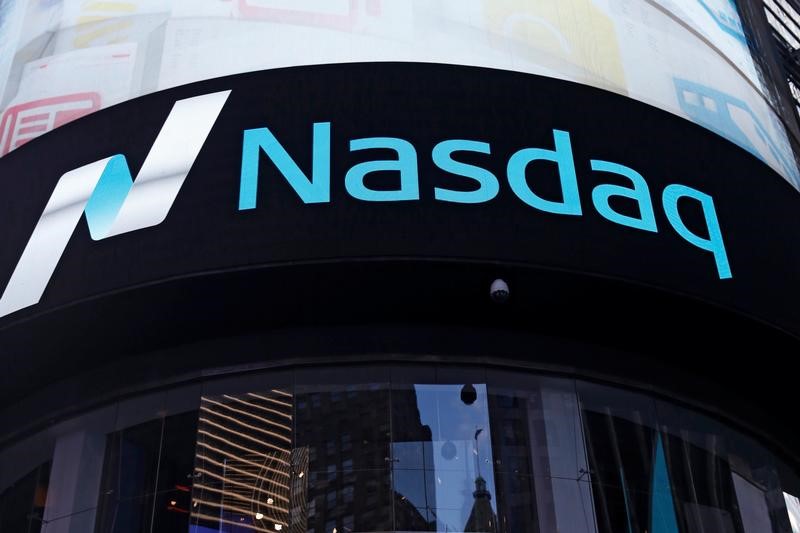* Tech sector falls again on worries about more regulation
* Trade worries simmer as China flags retaliatory tariffs
* Bond yields fall as investors review policy expectations
* World stocks facing first quarterly fall in two years
* Wall Street set to open flat to lower
By Marc Jones
LONDON, March 28 (Reuters) - Stocks stumbled again on Wednesday, as jitters about a U.S.-China trade war and regulatory crackdown on tech firms such as Facebook FB.O left investors facing their first quarterly fall in equity markets in two years.
Europe's main bourses 0#.INDEXE fell as much as 1 percent in their fifth sell-off in six and the tech-heavy Nasdaq .NDX opened in the red in the United States again, all of which was enough to send traders piling back into the safety of bonds. .EU
German Bunds, seen as Europe's most secure asset due to Berlin's triple-A-rated finances, rallied hard to send 10-year yields back under 0.5 percent for the first time since early January as U.S. Treasuries nudged toward 2.75 percent. GVD/EUR
The rout in stocks came after the tech woes had given the Nasdaq its worst day since June 2016 .N on Tuesday. Losses were extended after China's state-run Global Times reported that Beijing would soon announce a list of retaliatory tariffs on United States imports. hitting a record on Jan. 26, world stocks have been battered by worries about rising inflation, the pace of U.S. interest rate hikes and the possibility of a global trade war. The 47-country MSCI global index .MIWD00000PUS is down 9 percent from its high.
"We are rotating from the old regime of low interest rates and growth stocks like the FAANGs (Facebook, Amazon (NASDAQ:AMZN), Apple (NASDAQ:AAPL) Netflix (NASDAQ:NFLX) and Google) into a new world where that paradigm is rocked and that creates volatility," said SEB Investment Management's global head of asset allocation Hans Peterson.
The pan-European STOXX 600 .STOXX index was last down 0.4 percent having been as far as 1.1 percent in the red early on when the region's tech sector .SX8P went down 2.6 percent. .EU
Nasdaq and S&P 500 went south again too in early deals to add to what has already been a $400 billion wipe out for the FAANGs alone since mid-March. .N
Tuesday's battering saw the Nasdaq slump almost 3 percent .IXIC and the broader S&P .SPX drop 1.7 percent. As well as the Facebook nosedive, Twitter TWTR.N fell 12 percent while Google parent Alphabet GOOGL.O slid 4.5 percent.
Asia .MIAPJ0000PUS tumbled 1.5 percent overnight, with Japan's Nikkei .N225 ending down 1.3 percent and top Chinese internet stock Tencent 0700.HK down 4.6 percent. .SS
Another weak U.S. spot had been Nvidia NVDA.O , which fell 7.8 percent after the chipmaker temporarily suspended self-driving tests across the globe after an Uber UBER.UL autonomous vehicle killed a woman. is a sense that there will be more regulations on Facebook or FANG and that the cost of compliance will increase," said Nobuhiko Kuramochi, chief strategist at Mizuho Securities.
TRADING BLOWS
The report that Beijing plans to announce retaliatory tariffs against U.S. President Donald Trump's plans for tariffs on up to $60 billion of Chinese goods was also rekindling worries about a Sino-U.S. trade war.
While the market remains highly vulnerable to news headlines like this, reports of behind-the-scenes talks between Washington and Beijing spurred some optimism.
"It would be in China's interest to pursue trade rather than taking retaliatory actions. So eventually, they are likely to avert a trade war and strike a deal that will please (U.S. President Donald) Trump and increase trade," said Hiroshi Watanabe, economist at Sony Financial Holdings.
"The market is still nervous, and there's a feeling you never know what Trump will do. But excessive wariness is likely to gradually wane," he added.
In the currency market, the dollar get some respite from its recent selloff as revised fourth-quarter U.S. economic growth data slowed less than previously estimated and revealed the biggest gain in consumer spending in three years. greenback bounced 106.13 yen having earlier been changing hands at 105.51 yen JPY= which was not far from Monday's 16-1/2-month low of 104.56.
It knocked the euro off a near a six-week high too. The shared currency was bacl below $1.24 but still on track to post its fifth consecutive quarter of gains. It is up more than 3 percent since the start of January.
Comments on Tuesday by ECB policymaker Ewald Nowotny, who said the central bank will probably decide this summer to cull its bond purchases and warned that the ECB must not fall "behind the curve", had helped underpin the euro.
Germany's 10-year Bund yield DE10YT=TWEB hit a two-month low below 0.500 percent though, having taken a downward shift since hitting a 1-1/2-year high of 0.795 percent in Feb. 15.
The 10-year U.S. Treasuries yield US10YT=RR dropped to 2.76 percent, its lowest level in seven weeks. The two-year yield US2YT=RR stood at 2.26 percent.
"There's a general rotation from risky assets towards safe haven assets ... with weakened equities and trade war tensions in the general backdrop," said ING rates strategist Benjamin Schroeder.
In commodity markets meanwhile, oil prices slipped as a report of increasing U.S. crude inventories from industry group American Petroleum Institute (API) surprised many traders.
U.S. WTI crude futures CLc1 dropped 0.8 percent to $64.85 while Brent crude futures LCOc1 traded 0.7 percent lower at $69.95 per barrel, off Monday's high of $71.05, which was its highest since late January.
Gold eased down from a five-week high to just under $1,340 per ounce. GOL/
<^^^^^^^^^^^^^^^^^^^^^^^^^^^^^^^^^^^^^^^^^^^^^^^^^^^^^^^^^^^ MSCI, Nikkei datastream chart
http://reut.rs/2sSBRiD FANG shares
https://reut.rs/2Iaiubo
^^^^^^^^^^^^^^^^^^^^^^^^^^^^^^^^^^^^^^^^^^^^^^^^^^^^^^^^^^^>
